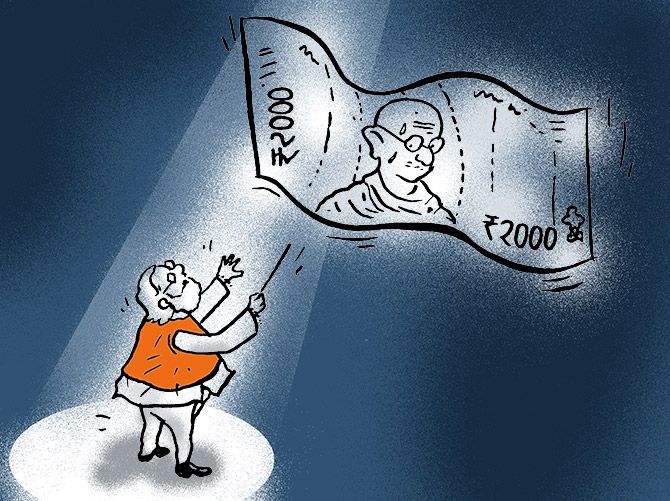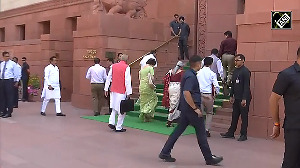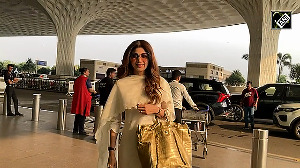'The world's economy is booming and growing at 3%. But even in this environment, India's growth has declined.'
'This is because of the deliberate slowing down induced by eccentric actions like demonetisation,' argues Aakar Patel.

Illustration: Dominic Xavier/Rediff.com
Narendra Modi is the most talented politician of our times, not just in India but also farther afield.
It is not easy to come up with names of elected leaders who are so popular. I can think of Putin in Russia and Erdogan in Turkey, who are somewhat similar.
I do not understand the politics of those nations to any great extent, but I do know that the support enjoyed by them is similar to Modi's in one sense.
The individual leader in all three instances is more popular than the party because he has broadened the traditional base.
Modi regularly polls an approval rating of over 70%. I recognise that such polls are inaccurate and to a large extent unscientific but even so the consistency with which he achieves this is remarkable given that his party has only ever got 31% of the all-India vote at its peak, which was in 2014.
Anecdotal evidence, meaning the people I speak to about this, also confirms that he is a popular leader.
If we examine the case of Modi, we can discern the following types of people who are attracted to him and his style of politics.
The most important is his base of upper caste, middle class and urban voters.
The BJP sweep of the cities in Gujarat confirms this analysis: Even when the party's policies are failing in the rural and semi-rural areas, it is this base that remains firmly behind the BJP, and to a larger extent, Modi personally.
The reasons for this support are several. The middle class is convinced that this country is run poorly and needs to be straightened out through radical actions.
The idea of a strongman coming in to do this has always found appeal in this section, and as someone who is almost 50 years old I can report that this has been the case for at least three decades.
This perspective, of course, is reductionist and simplistic, but I don't want to discuss that today.
The anti-reservations stance of the Rashtriya Swayamsevak Sangh, and its Brahminised view of culture are in alignment with how this group broadly sees the world around them.
This community is highly nationalistic (they are the people who flock to the events that Modi holds with the Indian immigrants when he's abroad), which fits in with the posture of the BJP. The powerful nationalism means that they are almost totally brainwashed on the issues of Pakistan and China.
Fortunately, this missing ability to engage with complexity also falls into place with the BJP's outlook.
Economically, this is the community that depends on high GDP growth, an expansion of white collar jobs, investments in modern infrastructure (example: Bullet train over rural roads and airports over state transport buses).
It is not easy to generalise on the matter of minority rights. However, while accepting that the dislike of minorities is something all South Asian communities have, an excess of violence will trouble this community, if only because it clashes with their perceptions about India.
The pure idea of 'secularism' does not appeal to them to any large extent and this is essentially a construct.
Not many Indians vote for secularism.
Being middle class and therefore salaried for the most part, this group sets great store by 'merit' and is attracted to Modi because he is self-made unlike dynastic Rahul.
The second category of Modi supporter is the regular BJP supporter, who gravitates towards the party because he comes from the dominant caste that supports the party, like the Lingayat in Karnataka, the Patidar in Gujarat and the Rajput in Rajasthan.
The third one is the Indian who is attracted to Hindutva and believes that the enemy is internal and needs to be sorted out before India progresses.
I don't think either of the latter two categories is particularly important or interesting for this argument because they will remain with the BJP no matter who the party is led by, whether Modi or anyone else, and now or in the future.
It is the charisma and belief in Modi as an individual with the ability to deliver that separates the first category from the others.
We have all of 2018 before us, the last full year before the elections. The data is in on Modi's economic performance: He's a flop. Manmohan Singh has pointed out that Modi will be unable to match the average rate of growth delivered by Singh over a decade.
In the corporate world (which loves Modi), where the chief executive is judged by quarterly results, Modi would have been fired.
To me the important data point is this: In 2009 the world's economy contracted because of the financial crisis. Today it is booming and growing at 3%. But even in this environment, India's growth has declined.
This is because of the deliberate slowing down induced by eccentric actions like demonetisation.
This failure will influence Modi and the BJP negatively when they prepare the pitch for the 2019 elections. There is no economic achievement to speak of (when was the last time you head the 'fastest growing nation' line?) and I don't think there will be a positive campaign like the Achche Din type of 2014.
It will be vicious and divisive. As an Indian it will be depressing. As a writer and observer of our society, it will be utterly fascinating to see how the first category, to me the most important pillar of Modi's personal support, reacts to it.
Aakar Patel is Executive Director, Amnesty International India. The views expressed here are his own.
- You can read Aakar's earlier columns here.











 © 2025
© 2025